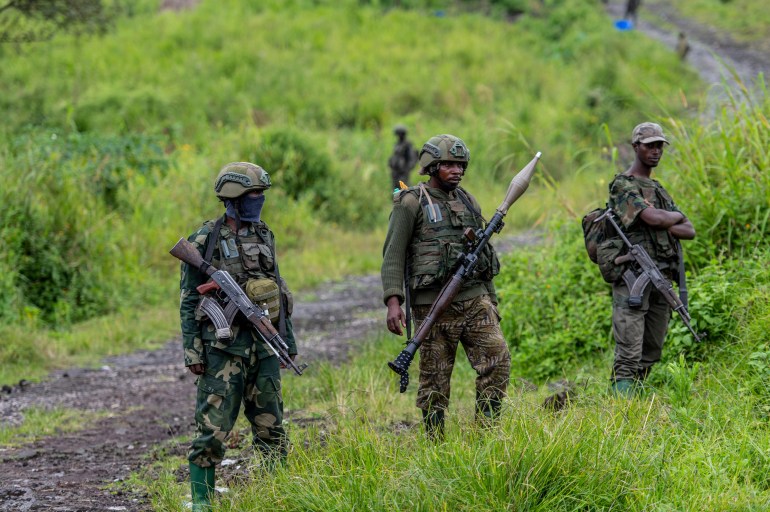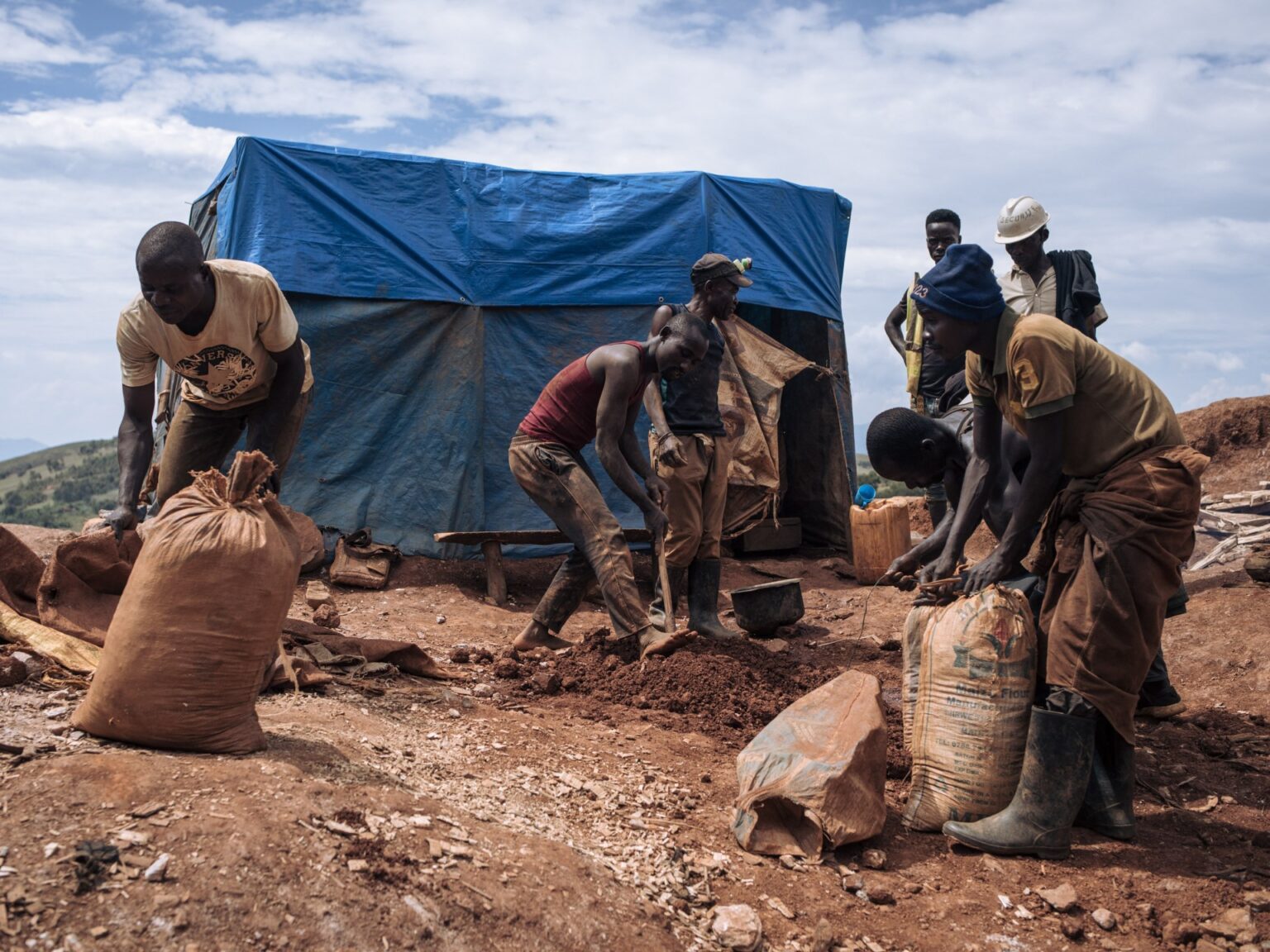The Democratic Republic of the Congo (DRC) has filed criminal complaints against tech giant Apple’s subsidiaries in France and Belgium over the use of “conflict minerals” in their supply chains.
Lawyers representing the Central African country, claimed in a statement this week that Apple’s subsidiaries in Europe are using conflict minerals sourced in sub-Saharan Africa and accused the company of “using deceptive commercial practices to assure consumers that the tech giant’s supply chains are clean”.
So, what are conflict minerals and why has Apple been accused?
What are conflict minerals?
They are minerals which are typically sourced from high-risk areas afflicted by conflict.
The war-ravaged DRC, Sierra Leone and Venezuela are among those countries in which such minerals are found.
“Conflict minerals is a term given by the Organisation for Economic Co-operation and Development (OECD) to tantalum, tin, tungsten and gold sourced from so-called conflict-affected and high-risk areas,” Christoph N Vogel, author of the book Conflict Minerals Inc, told Al Jazeera.
In a report published in October this year, the United States Government Accountability Office (GAO) noted that various industries around the world mainly use four conflict minerals – tantalum, tin, tungsten and gold.
Tantalum is mostly used to manufacture capacitors which store electrical energy in cell phones, computers and also turbines in jet engines.
Tin is used in automobile parts and food packaging.
Tungsten is also used to manufacture automobiles and cutting tools, and is the key element used in light bulbs.
Gold is used as jewellery and also in electronics like laptops and cell phones.
Many human rights organisations have also noted that conditions for workers in the mines are often very poor, and can involve slavery and unpaid work.
Which conflict minerals are mined in the DRC?
According to the US GAO report, the eastern part of the DRC is one of the key areas in the world rich in the four listed minerals – tin, tungsten, tantalum and gold – collectively called the 3TGs.
This part of the DRC has been ravaged by violence for more than 30 years. At least 200 armed groups there have been vying for control of the mines from which these minerals are sourced.
Alex Kopp, senior campaigner at the Global Witness NGO’s transition minerals team, told Al Jazeera that in the DRC, “they [rebels] occupy mines and also the trading routes. They basically force the workers in the mines to work for free for a day or a week and they illegally smuggle the minerals through places like Rwanda. The minerals then get exported legally to big companies like Apple.”
Why are conflict minerals so controversial?
Profits from the minerals are believed to prop up armed groups’ activities.
Cobb said the Rwandan-backed armed group M23, for example, is believed to control coltan production in the Rubaya area of DRC. This region supplies about 15 percent of the world’s tantalum, the metal into which coltan, used in the manufacture of mobile phones and laptops, is processed.
“The price of exported coltan was between $39 and $43 per kilo between January and May 2024, according to the Rwandan central bank. Through this money, rebel groups like M23 buy weapons, for example, and have prolonged the war in DRC,” Kopp said.
Vogel said profits from the mines add to those made through other enterprises. “Mines come into play when there is no easier or better option – but often there is. They make more money through roadside taxation initiatives, customs etc,” he said.
Why is the DRC accusing Apple of being involved in this?
The DRC’s scrutiny of Apple’s use of minerals in the region began in September last year when the country’s president, Felix Tshisekedi, met lawyers from Amsterdam & Partners LLP – the main legal firm representing the country in the conflict minerals case – in Kinshasa.
According to a statement from the law firm, Tshisekedi ordered the lawyers to investigate the supply chain of “3T minerals (tin, tungsten and tantalum) sourced from Congolese territory and illegally exported”.
On April 22 this year, the lawyers contacted Apple CEO Tim Cook after their research revealed Apple’s supply chain could be “tainted by blood minerals pillaged from the country [DRC]”, referring to the 3T minerals. The company’s firms in France were also notified. But, the lawyers say, they did not receive a reply for several months.
Back then, Apple told Reuters: “We found no reasonable basis for concluding that any of the smelters or refiners of 3TG determined to be in our supply chain as of December 31, 2023, directly or indirectly financed or benefited armed groups in the DRC or an adjoining country.”
On December 17, the lawyers representing the DRC filed criminal complaints against Apple’s branches in Europe in courts in France and Belgium.
Robert Amsterdam, one of the lawyers involved in the case, said: “Colour Apple red, and not green. It is a trillion-dollar company that must be assumed to know the consequences of its actions. Enough with denials of accountability and hiding behind the false narrative of supply chain defences!”
How has Apple responded?
Apple denies the allegations. In a media statement on Tuesday, Apple said: “As conflict in the region escalated earlier this year we notified our suppliers that their smelters and refiners must suspend sourcing tin, tantalum, tungsten and gold from the DRC and Rwanda.
“We took this action because we were concerned it was no longer possible for independent auditors or industry certification mechanisms to perform the due diligence required to meet our high standards.” The group added that minerals used in Apple gadgets are recycled.
On Wednesday, the lawyers representing the DRC said Apple’s statements were “satisfactory” but needed to be verified on the ground.
Will the case proceed?
Yes. The lawyers said they will continue to press their case against Apple’s branches in Europe.
“These complaints filed against Apple are a matter of great public interest at a time when European countries, consumers and non-governmental organisations are increasing their scrutiny of international supply chains,” Christophe Marchand, the case’s lawyer in Brussels said in a statement.
Why is the case being prosecuted in Europe?
The 27-member European Union (EU) has regulations in place to ensure its “importers of 3TG meet international responsible sourcing standards, set by the Organisation for Economic Co-operation and Development (OECD); ensure that global and EU smelters and refiners of 3TG source responsibly; help break the link between conflict and the illegal exploitation of minerals, and help put an end to the exploitation and abuse of local communities, including mine workers, and support local development.”
The lawyers have, therefore, also written to European Commission President Ursula von der Leyen demanding that she address the EU’s accountability for ending “armed violence in sub-Saharan Africa’s mineral supply chains”.
So far, according to the DRC lawyers’ spokesperson, they have not received a response.
“DRC wants to achieve the denunciation of the crimes and a change in the supply chains through these lawsuits,” the spokesperson for the lawyers added.

Have other companies used conflict minerals?
Global Witness traced supply chains globally and identified companies that have sourced or smuggled conflict minerals.
“We have found these minerals may end up in products by international brands such as Apple, Intel, Samsung, Nokia, Motorola and Tesla,” a May 2022 report by the NGO found.
“Many international companies sourcing 3T minerals for their products, including for computers, electronics and cars, arguably do too little to detect smuggling, fraud, conflict links and child labour in the supply chain,” the report noted. It added that companies like Apple have been warned about how their minerals are sourced and smuggled, but have applied too few mitigation measures.
“Apple has promoted itself as one of the leading companies, to responsibly deal with conflict minerals. I think they’re very much aware of the way they source the minerals from DRC as well as the smuggling that takes place,” Kopp said.
Apple did not respond to Al Jazeera’s interview request.
How should companies source minerals in the DRC?
The OECD established a five-step framework for companies on approaches to conflict minerals in 2016.
The guidelines include establishing a strong company management system with transparency over the mineral supply chain; assessing risks in mineral supply chains and designing a strategy to address these risks such as temporarily suspending the trade of the mineral; involving third parties to audit supply chains; and publicly reporting on the supply chain in annual reports.
In the US, the Dodd-Frank Act of the Securities and Exchange Commission also requires companies to file a specialised disclosure report if “they manufacture, or contract to have manufactured, products that contain conflict minerals necessary to those products’ functionality or production and file an additional conflict minerals report”.
Kopp added that authorities in the DRC can do more by imposing laws to prevent the smuggling of minerals.
Further, he said, “the international community should put pressure on neighbouring countries like Rwanda which allegedly back rebel groups like M23, to take action to stop the conflict in DRC and control the borders by also looking into how minerals are traded”.
Read the full article here


